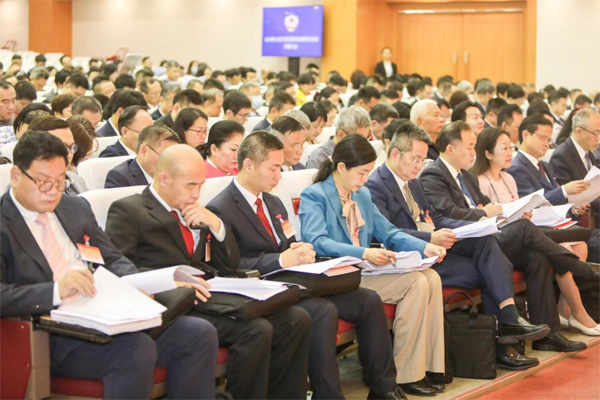Tianhe should promote low-altitude economy
Several proposals were submitted to the fourth session of the ninth Tianhe District Committee of the Chinese People's Political Consultative Conference (CPPCC), which kicked off on March 18 in Guangzhou's Tianhe district.
Zhang Lilian, a member of the ninth CPPCC Tianhe District Committee and vice president of PCITECH, stressed the importance of promoting the development of new-type artificial intelligence and creating a new growth driver for the district.
She proposed that the construction of the data center, the intelligent computing center, and the supercomputing center should be advanced in the district, and the application of large models should be encouraged in the district's critical industries like business and trade, transportation, and finance.

Members listen to the work report at the fourth session of the ninth CPPCC Tianhe District Committee. [Photo/Guangzhou Daily]
"The incorporation of the low-altitude economy into this year's Guangdong provincial government work report marks a significant milestone, one that Tianhe should leverage as an opportunity," stated Xue Peng, vice president of EHang and member of the ninth CPPCC Tianhe District Committee.
Xue also suggested that Tianhe should fully exploit its advantages of rich sci-tech innovation and talent resources, build a production-education integrated highland for a low-altitude economy, and launch supportive policies to encourage social capital to participate in operations.
Lu Yuefeng, a lawyer at Dentons Guangzhou Office, told the committee that Tianhe ought to continue its efforts in building an international commercial legal service system and accelerate the integration of legal services and modern industries.
Guan Shaofeng, industry director at the Guangdong Branch of China Unicon, noted that hosting international coffee festivals and creating an exchange platform for coffee culture will help attract leading coffee enterprises to Tianhe.
Mao Ganmin brought two proposals to this year's Tianhe District Committee. The proposals focus on promoting Guangdong's "100 counties, 1,000 towns, and 10,000 villages" development projects and advancing the district's green development.
